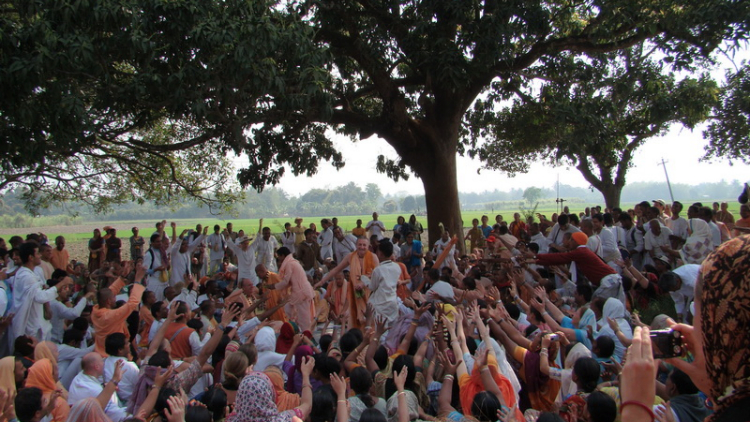Ten Thousand to Attend 25th Annual Navadvipa Pilgrimage
By Madhava Smullen | Янв 10, 2014

Ten thousand devotees, from all over the world, are expected to attend the special 25th anniversary Silver Jubilee Navadvipa Mandala Parikrama from March 5th to 11th this spring.
The Navadvipa area of West Bengal is considered sacred as it is the place where Sri Chaitanya Mahaprabhu — believed to be an incarnation of Lord Krishna, or God Himself — lived and taught his message of chanting God’s Holy Names.
Parikrama, or pilgrimage around the area has been observed since the 1500s, by such luminaries as Chaitanya’s own followers Nityananda Prabhu and Jiva Goswami.
It was first introduced to ISKCON devotees by the society’s founder Srila Prabhupada in 1972.

Deities of Chaitanya Mahaprabhu’s parents, Jagannath Misra and Sacimata (holding young Nimai in her lap)
“Prabhupada used to take the devotees to different islands of Navadvipa Mandala by bus, and then they would come back to the temple in Mayapur for the night,” says current parikrama organizer Sankarshan Nitai Das.
But it wasn’t until 1990, twenty-five years ago, that Prabhupada’s disciples Lokanath Swami and Jayapataka Swami led around eighty devotees on the first walking pilgrimage, during which they camped out at night in between visiting holy places.
The parikrama grew year after year. “First one group became two: an international group, and a local Bengali one,” says Sankarshan Nitai. “Then we made a separate Russian group, and then a Hindi one. Next, we divided the Bengali group into two. And this year, we’re adding another local group, for a total of six.”
In 2013, seven thousand devotees attended Navadvipa Mandala Parikrama, and this year, an incredible ten thousand are expected.

Devotees gather to pay their respects at Yoga Pitha, the birthplace of Sri Chaitanya Mahaprabhu
Devotees will gather for the Adhivasa ceremony on March 4th — the day before the parikrama begins — at Yoga Pitha, where Sri Chaitanya Mahaprabhu appeared in 1486. There, devotees will pray for the blessings of Lord Chaitanya to perform parikrama. The event will also include speeches by senior devotees on the history of Navadvipa Mandala Parikrama, and appreciation of those who have kept it going for so long.
The next day, the pilgrims will set out, led by ISKCON gurus such as Jayapataka Swami, Lokanath Swami, Bhakti Charu Swami, and Bhakti Purusottama Swami, as well as other senior devotees like veteran Mayapur priest Jananivasa Das.
Navadvipa means, literally, “nine islands,” and over the next week, the pilgrims will systematically visit all the holy places in each of the nine islands: Godrumadvipa, Madhyadvipa, Koladvipa, Ritudvipa, Jahnudvipa, Modadrumadvipa, Rudradvipa, Simantadvipa, and Antardvipa.
According to Gaudiya Vaishnava lore, many of the holy places elsewhere in India are also contained in Navadvipa. So in Godrumadvipa, the devotees will visit Nandan Acharya Bhavan, where Lord Chaitanya met his associate Nityananda Prabhu, and Am-Ghata, where he planted a mango seed which immediately developed into a tree bearing ripe fruits. But they’ll also visit Nrsimhapalli, the place where Krishna’s half-man, half-lion avatar Lord Nrsimhadeva rested after killing the demon Hiranyakashipu.

Devotees gather to pay their respects at Yoga Pitha, the birthplace of Sri Chaitanya Mahaprabhu
Elsewhere, devotees will see Panchaveni, the confluence of five holy rivers; Naimisaranya, where the ancient scripture Srimad-Bhagavatam was spoken; and Sri Dhamesvara Mahaprabhu, where a Deity of Sri Chaitanya was worshipped by his wife Vishnupriya Devi after he took the renounced order.
They’ll also visit the ruins of the house of Lord Chaitanya’s mother, Sacimata; Khol Bhanga Danga, where the soldiers of the Chand Kazi broke mridanga drums used by Sri Chaitanya’s followers; and the residences of the Lord’s close associates Advaita Acharya, Gadadhara Pandit, and Srivasa Thakura, among many, many other holy places.
Throughout the pilgrimage, devotees will absorb themselves in the nine processes of devotional service which each correspond with one of the nine islands of Navadvipa: listening, chanting, remembering, praying, serving the Lord’s feet, worshiping the Deities, becoming a servant, being a friend, and complete surrender.
They’ll walk between five and fourteen kilometers each day, get served three prasadam meals a day, and participate in bhajans and seminars by many senior devotees.
Over the years, pilgrims on Navadvipa Mandala Parikrama have expressed their appreciation for the wonderful association, the timely prasadam, and the endeavors by organizers to make them more comfortable. They’ve also given some constructive feedback, which organizers plan to make an extra effort to fulfill this year for the 25th anniversary.

Parikrama leader Lokanath Swami speaks
“We are planning to give a very special experience to the participants on this year’s parikrama,” Sankarshan Nitai says. “We will try to take personal care of everyone, serve them better prasadam, give them more comfort during their walks, and improve their tents where they sleep at night. Overall, we want to improve our level of service to make everyone happier!”
In the future, parikrama organizers plan to make conditions even more comfortable for pilgrims by constructing permanent facilities along the pilgrimage route where devotees can stay.
Meanwhile, the Navadvipa Mandala Development Trust plans to preserve many holy places of Sri Chaitanya Mahaprabhu’s pastimes — such as Naimisaranya, Kurukshetra, and Puskara Tirtha — by purchasing the land they’re located on to prevent them from being built on and eventually lost.
This is sure to be appreciated by ISKCON devotees, who will continue to gain immense spiritual benefit from Navadvipa Mandala Parikrama for many years to come.
“It’s such a wonderful experience to do parikrama in a big group, walking together with so many devotees,” says Sankarshan Nitai, “And to feel the presence of Chaitanya Mahaprabhu as you do so.”















